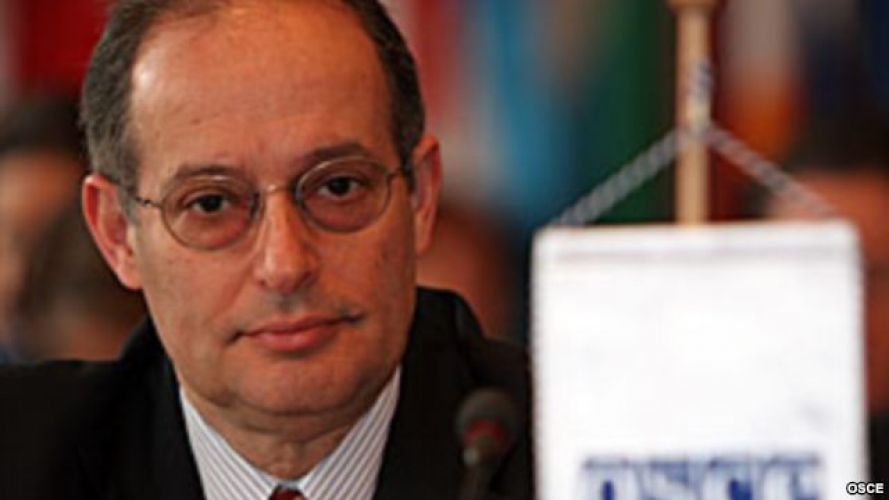GENEVA (9 February 2016) – “During the four months since the October presidential elections, no changes have been initiated in Belarus to alter the oppressive laws and practices, while numerous cases of new violations of basic rights have emerged.
The election, just as all votes since the 1990s, fell short of democratic standards, and the incumbent was reappointed following an unverifiable turnout and an intransparent ballot count1.
Nevertheless, along with intergovernmental and domestic human rights organizations, I commended that political prisoners had been released on the eve of the election. It seemed a good start that, unlike during the 2010 election, the authorities refrained from violence against political opponents, and they did not arrest the rival candidates.
Unfortunately, the dismal state of human rights has remained unchanged in the country. Despite the partial suspension of EU and US sanctions, decided in anticipation of further advancement of human rights, the authorities have not ceased the systematic harassment of those who attempted to practice their individual, civil, political, and other rights. Neither have they shown any willingness to reform the entrenched, highly oppressive legal system.
I recall some of the many violations since the election, among them both continuing and new cases.
- No steps were taken to restore the civil and political rights of the released political prisoners. At the same time, politically construed criminal cases against the 2010 presidential candidate Ales Mikhalevich and journalist Aliaksandr Alesin continue, just as the imprisonment of cultural activist Mikhail Zhamchuzhny.
- The ban on entry into the country has been upheld against Belarusian human rights activist Alena Tankachova, and no safe re-entry has been granted for those forced to leave the country due to political persecution.
- The registration of human rights organizations “For Fair Elections”, Viasna, and others has been repeatedly rejected on flimsy administrative reasons.
Throughout these months, opposition leaders, human rights activists, journalists, and many other citizens have been subjected to harassment, administrative procedures and fines2:
- Trumping the repose in persecution during the elections, participants of the election rallies were fined months later.
- In October 2015, organisers of a commemoration of victims of Stalin-era repressions – former political prisoner Mikalai Statkevich, opposition leaders Uladzimir Niakliayeu, Anatol Lyabedzka and Maksim Viniarski -, were charged with administrative offences and fined.
- On 24 November 2015, peaceful protests in Minsk marked the nineteenth anniversary of the 1996 change of the Constitution that gave President Lukashenko near-absolute powers, as well as the memory of disappeared politicians. Administrative proceedings ending with fines were started against several participants, among them Pavel Seviarynets, a leader of the Belorussian Christian Democratic Party.
- In December 2015, participants of student marches, commemorations of the Universal Declaration of Human Rights, and protests against the death penalty were harassed and penalized.
- Since 18 January 2016, 30 participants in a Minsk solidarity rally with petitioning small entrepreneurs have been facing charges of administrative offenses.
- On last 29 January, the graffiti artists Maksim Piakarski, Vadzim Zharomski, Yaraslau Uliyanenkau, and Viachaslau Kasinerau, apprehended while brutally beaten in 2015 for their non-conformist art, were sentenced to fines.
- During the trial, youth activists Pavel Siarhei and Maksim Shytsik, were assaulted by riot police, and Pavel Dabravolski, a journalist covering the abuse for the information Internet portal tut.by, was also brutally beaten3.
- Similarly, the practice of sanctioning freelance journalists continued and even worsened. Several contributors to the Poland-based satellite and online TV channel Belsat have been fined while denied registration in Belarus.
Ceasing all these arbitrary persecutions would only take political will in this highly centralized system.
However, the necessary changes need go much further than a lenient approach to existing oppressive regulations. The Government of Belarus should engage in a broad reform to bring legislation in compliance with its international human rights obligations.
- There is an imperative need to abolish the permission-based regime which for two decades has nullified the rights to freedom expression, peaceful assembly and association.
- It is urgent to repeal Article 193.1 of the Criminal Code, which criminalizes membership in associations and public events which did not receive permission from the authorities.
- Belarus is the last country in Europe and Central Asia still applying the death penalty. I am advocating for the commutation to life imprisonment of the two death sentences handed down in 2015. On 5 January 2016, the first death sentence of the year was handed down to Henadz Yakavitski. The immediate introduction of a moratorium on executions could help the authorities to refrain from their constant violation of the right to life. Finally, a legal moratorium on the capital punishment as such, with a view to its abolishment, should be initiated.
- Belarus has for twenty years been the only country in Europe where there is no opposition in parliament. The forthcoming parliamentary elections in 2016 will also be an opportunity for the authorities to attest of their commitment to reform, by ensuring that free and fair parliamentary elections lead to the formation of a strong, pluralistic legislative body.
I stand ready to cooperate with the authorities. Engagement with the UN Human Rights mandate would be one of the steps speaking for the willingness of the authorities to improve the human rights situation in the country, and to work toward abiding by international standards.”
Related articles





